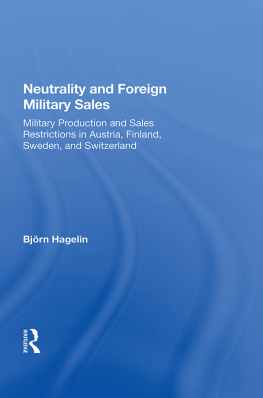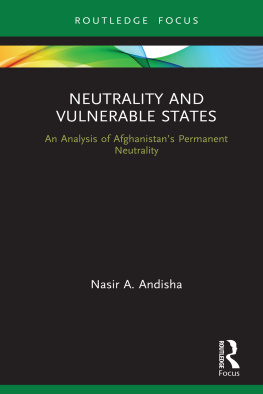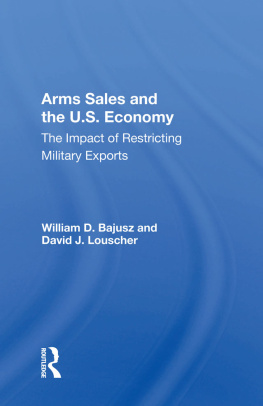Neutrality and Foreign Military Sales
First published 1990 by Westview Press
Published 2018 by Routledge
52 Vanderbilt Avenue, New York, NY 10017
2 Park Square, Milton Park, Abingdon, Oxon OX14 4RN
Routledge is an imprint of the Taylor & Francis Group, an informa business
Copyright 1990 by Taylor & Francis
All rights reserved. No part of this book may be reprinted or reproduced or utilised in any form or by any electronic, mechanical, or other means, now known or hereafter invented, including photocopying and recording, or in any information storage or retrieval system, without permission in writing from the publishers.
Notice:
Product or corporate names may be trademarks or registered trademarks, and are used only for identification and explanation without intent to infringe.
Library of Congress Cataloging-in-Publication Data
Hagelin, Bjrn, 1947-
Neutrality and foreign military sales: military production and
sales restrictions in Austria, Finland, Sweden, and Switzerland/by
Bjrn Hagelin.
p. cm.
Includes bibliographical references.
ISBN 0-8133-7928-8
1. MunitionsEuropeCase studies. 2. Military assistanceCase
studies. 3. AustriaNeutrality. 4. FinlandNeutrality.
5. SwedenNeutrality. 6. SwitzerlandNeutrality. I. Title.
HD9743.E922H34 1990
382 .456234094dc20
89-48381
CIP
ISBN 13: 978-0-367-01479-7 (hbk)
Figures
Tables
Appendix Tables
In late 1984 a number of individuals from Austria, Finland, Sweden and Switzerland met at the Austrian Peace Research Institute (APRI) in Stadtschlaining, Burg. They agreed to pursue a research project about the European neutrals following national and international debates about their foreign military sales. Quite naturally, the Austrian participants were in the majority: Wilfrid Graf, Walter Lauber, Josef Binter (who hosted the meeting), Karl Wrister, Amo Truger and Peter Pilz. Finland was represented by Pertti Joenniemi, the originator of the idea, Jouko Huru and Arto Kosonen. The present author (Sweden) and Rudolf Wullschleger from Switzerland completed the group. A special thanks goes to Josef Binter and the APRI for the excellent arrangements and financial support.
Three preliminary national case studies were presented at the second meeting in Switzerland by Peter Pilz from Austria, Pertti Joenniemi from Finland, and the present author. One person who deserves our full appreciation is Rudolf Wullschleger. Not only did he cover part of the costs and arrange the meeting at the Trigon-Institut in Zurich, but he also invited the Swiss members: Toni Bernet, Peter Hug and Jakob Tanner. It fell upon Peter Hug to write the Swiss case study.
A third meeting was arranged by the Tampere Peace Research Institute (TAPRI), Finland, in the Spring of 1987. Peter Pilz had by then been elected representative of the Austrian Green Party and could therefore not devote more time to the project Amo Truger shouldered the responsibility for continuing the Austrian part of the project.
The present study would have involved much more hardship had I not had access to the mentioned unpublished and later updated case studies, the additional information supplied by individual group members and the financial support from external sources. I regret that I have not been able to use all of the information collected by the group. The Nordic Cooperation Committee for International Politics including Conflict and Peace Research, Stockholm, made it possible for me to attend most of the group meetings. The Committee also supported a trip to Tampere in the Fall of 1987. Most importantly, throughout the project Professor Peter Wallensteen and Associate Professor Mats Hammarstrm, Department of Peace and Conflict Research at Uppsala University, gave me invaluable comments and advice. Ms. Karin Lindgren, supported by a grant from the Nordic Cooperation Committee, saved me from the tedious task of compiling several years of statistical information from the Swedish National Bureau of Statistics. I am also grateful for suggestions on parts of the final manuscript by Dr. Wilhelm Agrell, Lund University, and Mr. Rickard Holm, Uppsala University. With the assistance of Mr. Gran Lindgren at the Department of Peace and Conflict Research the computer became my friend. Last, but not least, Jeanne Campbell, Michelle Starika and Jan Kristiansson at Westview Press corrected and edited the final text.
Nevertheless, I am solely responsible for the way the material is presented and for the conclusions drawn.
Bjrn Hagelin
Uppsala, Sweden
1
Introduction
Is there anything peculiar about neutrality apart from formal non-alignment in peacetime and the attempt to stay neutral in wartime? If so, what is it? These questions are as old as they are controversial (for reasons of simplicity the terms non-alignment and neutrality are used as synonymus in describing the general peacetime policy). On the one hand governments of neutral countries argue that neutrality is a peace-supporting and stabilizing policy in a world dominated by major-power politics. Representatives of alliance members, on the other hand, are not late to respond that peace, meaning primarily the avoidance of a hot East-West war in Europe after 1945, is the result of the two super-power alliances and their deterrent effects. From this point of view nuclear weapons and their mutually assured destruction have secured peace through fear. In such a bipolar view of the world, neutrality may even be regarded as a destabilizing policy.
There is also the argument that neutrality as such is not a viable alternative in a future war in Europe. The reason is not only that a future war is assumed by many to be, or to quickly become, an all-out nuclear conflict with no survivors. The reason is also that the neutrals in Europe, all of them small countries, are not seen by the critics to pursue a strictly neutral policy. Instead, because of the strong dependence of the neutrals upon international trade in general, and upon trade with the Western industrialized countries in particular, their foreign and security policies are also assumed to be biased. Neutrality therefore seems a theoretical policy with no place in the real world of international dependence, global power politics and welfare economics. In short, to the critics, neutrality is not a credible wartime policy.
But neutrality is just as much, if not even more so, a peacetime policy. It might even be called peaceful. Armed solutions to political, ethnic, religious and other sources of conflict should not be supported. This view has lead to a particular neutral dilemma, which was very strongly exposed during the 1970s and 1980s, when the bigger European neutrals - Austria, Finland, Sweden and Switzerland - started making headlines for their foreign military sales. Whereas until then the neutrals had generally been known for restrictive military sales policies, they were now recognized for their increasing sales, especially to poor countries or regions of the world.
Contrary to previous national debates about foreign military sales, the issue did not quickly disappear. This has been particularly evident in Sweden. Before, debates had generally been ad hoc dealing with individual cases of military sales. The debates had been as short or as long as the public and media interest permitted, which in general was not very long. This time, however, new deals - both legal and illegal - came to the surface, partly through investigative journalism. Some of these cases created big question marks as to the involvement of military firms, governments and individuals. Foreign military sales, not individual cases, were taken up as a political issue by itself with consequences for neutrality as a legitimate policy and national armament as a solution to national security. More public and academic interest arose around the issue. The public as well as political groups and individuals demanded and suggested changes of policy, ranging from an unconditional embaigo on all foreign military sales to a more liberal (according to some more realistic) foreign military sales policy.






![Saint Francis de Sales [Sales - The Saint Francis de Sales Collection [15 Books]](/uploads/posts/book/266802/thumbs/saint-francis-de-sales-sales-the-saint-francis.jpg)


![Saint Francis de Sales - The Saint Francis de Sales Collection [15 Books]](/uploads/posts/book/161144/thumbs/saint-francis-de-sales-the-saint-francis-de-sales.jpg)